
You've already interviewed everyone in your network. Your industry friends, former colleagues, that one person who knows everyone – they've all been on the show.
Now, you need to find new, interesting people worth inviting, preferably high-profile guests who'll bring real value to your audience. But where do you even start? Scrolling through LinkedIn for hours? Reading industry publications and hoping to stumble across someone compelling?
If you do this manually, you'll spend days just building a target list. Then comes actually tracking down their contact information, which takes just as long.
Lead finder tools help you identify potential guests based on industry, job title, company size, or recent activity. Then they provide verified contact details so you can actually reach these people. And there’s something for everyone: platforms with massive databases for bulk research, browser extensions for quick one-off lookups, and all-in-one tools that handle everything from finding contacts to booking the actual interview.
Below, we list seven of these tools that make guest discovery and outreach something you can handle in an afternoon instead of a week.
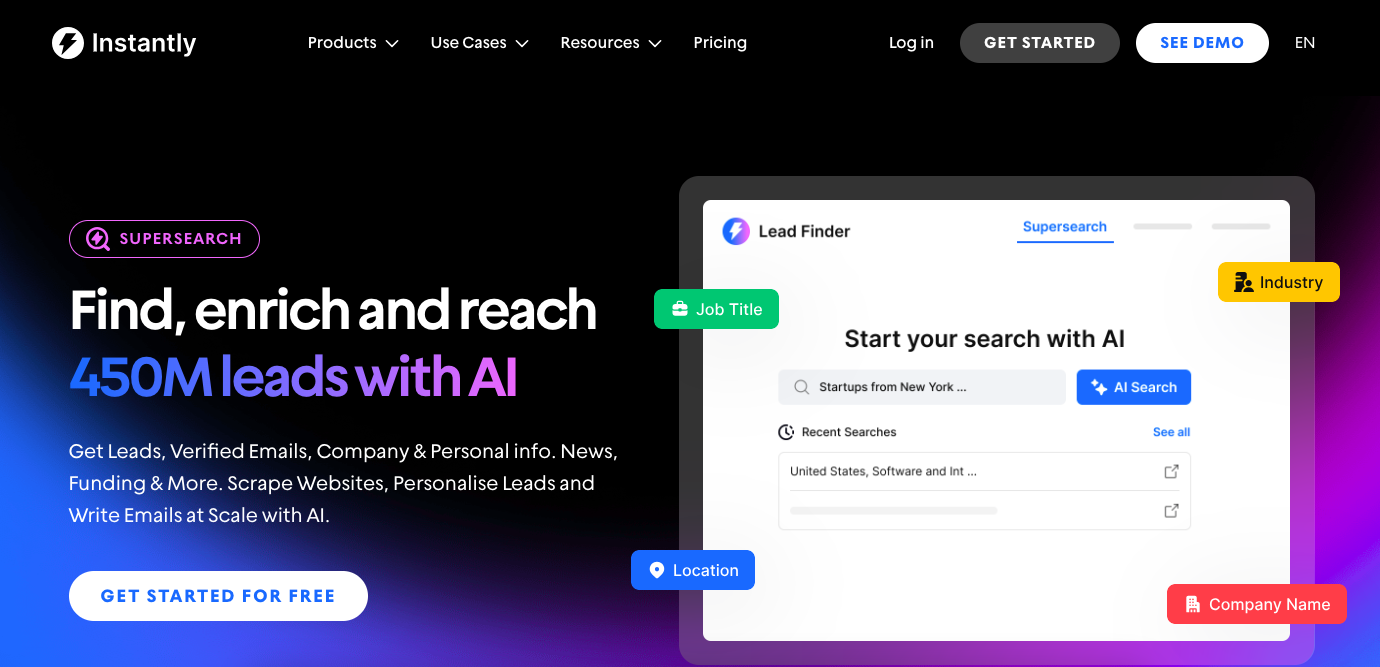
Instantly’s Supersearch gives you access to over 450 million pre-verified B2B contacts. For podcasters, this means searching by industry, job title, or company to find exactly the type of guests you want: CEOs in fintech, bestselling authors, or VPs at Fortune 500 companies.
The tool only charges you for verified emails, so you're not paying for invalid leads. You can search for "podcast guests" or "media appearances" in someone's bio to find people who actually do interviews.
The AI Web Research Agent pulls deeper intel on potential guests, such as recent company news or interview history. Copilot V2’s Execute Mode speeds this up even more, letting you create entire guest lists without clicking through multiple tabs or screens. There’s also an Internet search tool that grabs real-time data, so if someone just launched a book or changed jobs, you'll know.
After creating your guest list, you can run your cold outreach campaign right there in Instantly. Everything happens in the same tool, from finding contacts to tracking outreach in the Dealflow CRM, which means you can go from "I want this person on my show" to actually sending them an invite in about five minutes.
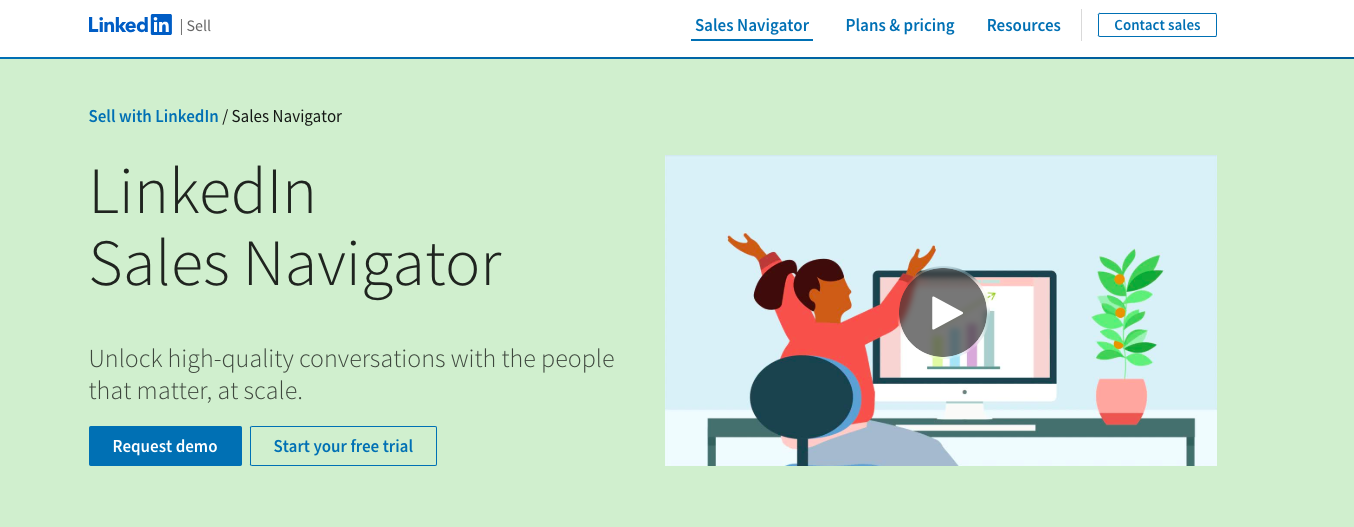
Most people don't realize how limited regular LinkedIn search actually is. Sales Navigator unlocks filters that let you search by seniority level, company headcount growth, years in current role, and even recent activity like "posted in the last 30 days."
The platform tracks engagement signals that tell you when someone might be open to opportunities. If a potential guest just published a post that went viral, got promoted, or launched a new product, Sales Navigator flags it. Perfect timing for a podcast invitation.
You can build and save lead lists directly in the tool, then export them to your outreach platform. The insights feature helps identify which prospects match your ideal guest profile based on industry, company size, and activity level.
Sales Navigator works best when you already know the type of guest you want but need to find specific people who fit that profile. The filtering gets granular enough to narrow 900 million LinkedIn users down to your exact target.
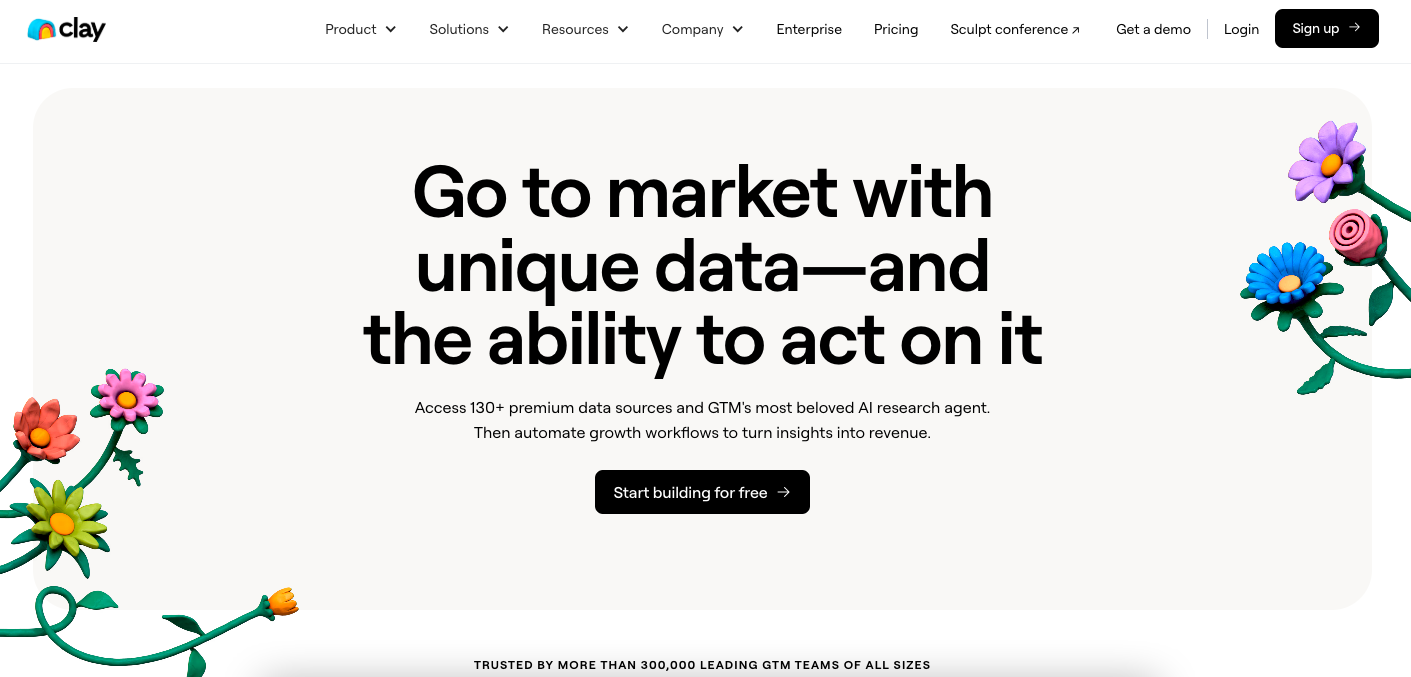
Clay works as a waterfall enrichment system, pulling contact information from 100+ data sources until it finds what you need. This means if one database doesn't have a potential guest's email, Clay automatically checks the next one, and the next, until it gets a hit.
The interface looks like Excel, which makes it familiar but maybe a bit technical for some users. The real power is Claygent, their AI web scraper. You can tell it to find "recent podcast appearances by CMOs in SaaS" or "authors who published books in 2024," and it pulls exactly that information. Clay’s AI agent also crafts outreach emails for each contact, so every single one of them feels personal and on-point.
And you know what the coolest part is? You can integrate Clay with Instantly. By doing so, you can find leads using Instantly's database right from within Clay, then add them directly to an Instantly campaign. Your enriched guest list flows straight into your outreach tool, where Instantly handles the actual pitching and follow-ups without you ever touching a spreadsheet.
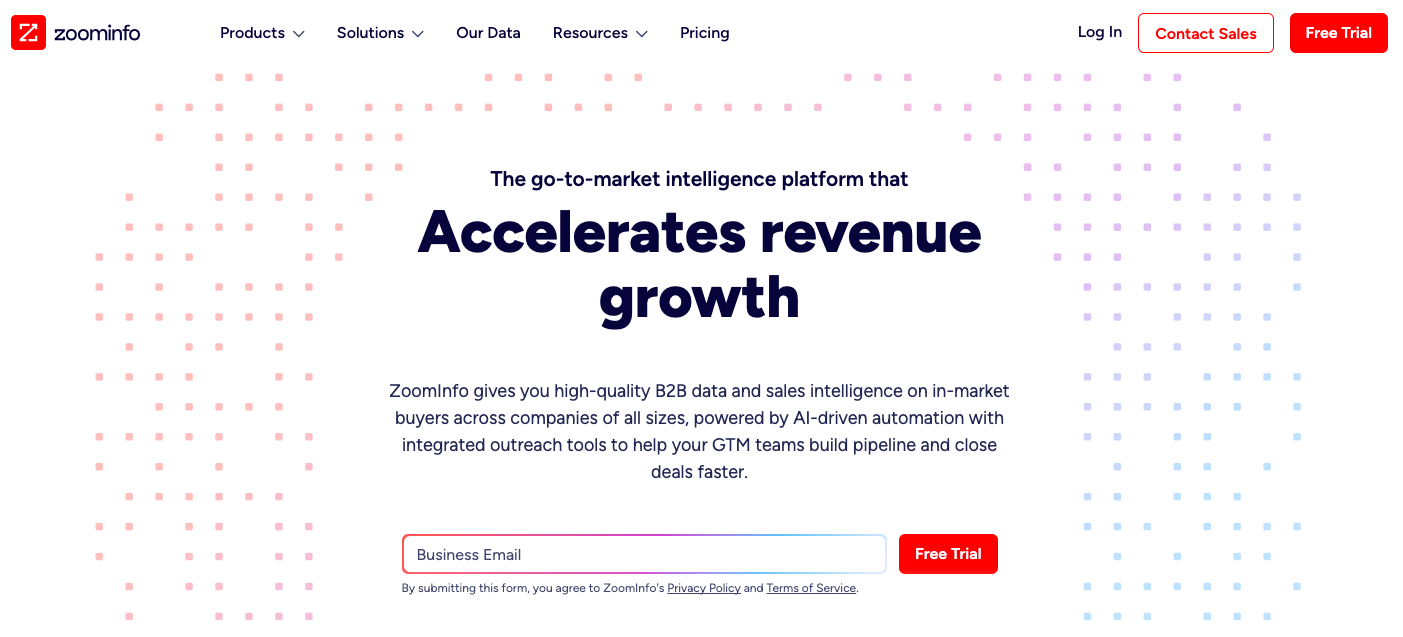
ZoomInfo maintains a pretty large B2B database, with over 260 million professional profiles and 135 million verified phone numbers. The platform focuses heavily on North American contacts, so it works best for podcasters targeting guests in the US and Canada.
For podcast booking, the form enrichment feature is particularly useful. Enter just an email address and ZoomInfo fills in everything else: job title, company size, recent role changes, even direct phone numbers. This gives you enough context to write personalized pitches without spending 20 minutes researching each person.
The Chorus feature analyzes your email conversations to spot patterns in what gets responses and what gets ignored. It can reveal which subject lines work, what time of day gets better open rates, or which pitch angles land meetings.
That said, ZoomInfo is pricier than other options on this list. It works as a full sales operating system, so it might be more than you need if you’re only after contact information.
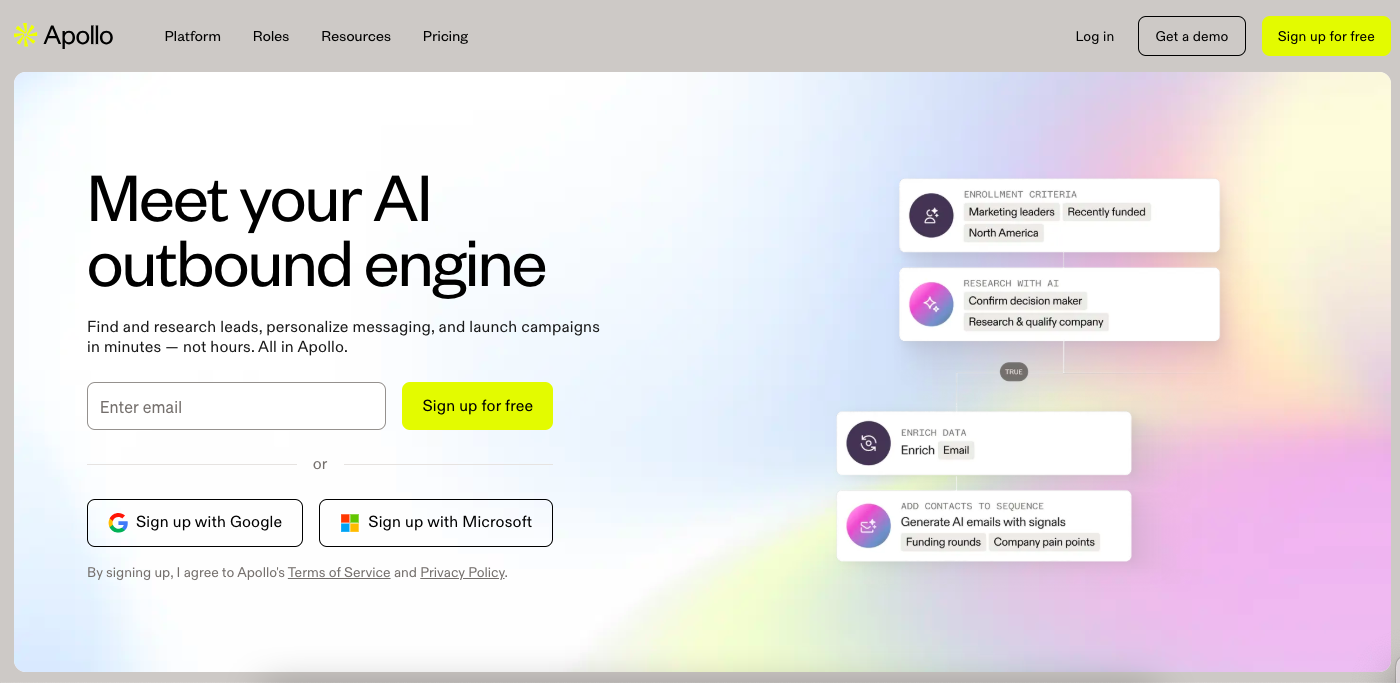
Apollo combines a massive database (275 million contacts, 73 million companies) with sales automation features in a single platform. The lead scoring feature lets you define what makes someone your ideal guest, then ranks everyone in its database based on how well they match.
Once you've found potential guests, the platform shows you recent developments, like funding rounds, new hires, or company expansions. These make natural conversation hooks for your pitch - reaching out right after someone's promotion or company milestone tends to get better response rates.
There’s also a built-in meeting scheduler that lets guests book time directly without the usual back-and-forth of "Does Tuesday work? How about Wednesday?" Just send a link and let them pick a time slot.
The automated sequences handle follow-ups without you tracking spreadsheets of who you contacted when. Send your initial pitch, and Apollo will remind non-responders at whatever intervals make sense for your booking timeline.
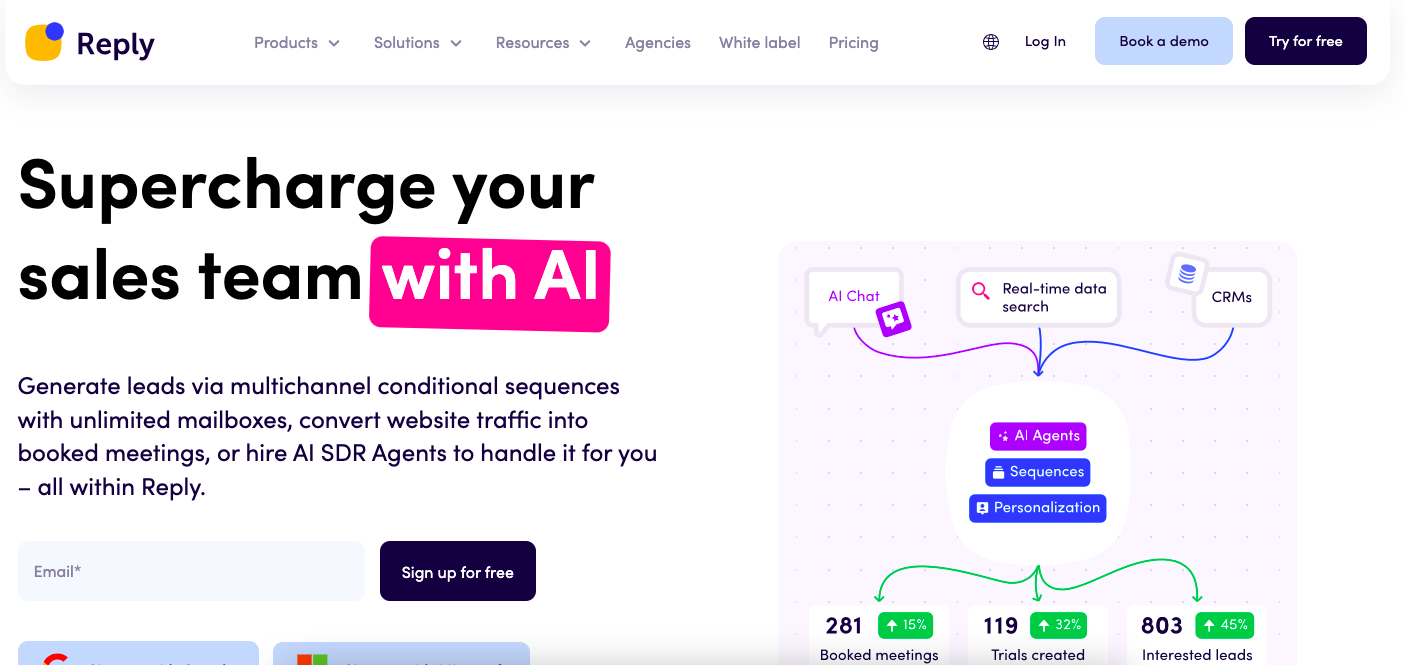
Reply.io gives you access to over 1 billion contacts in its real-time database, where you can search for guests and message them across multiple channels. Instead of pitching guests only through email and hoping they check it, you can follow up on LinkedIn a few days later, then try a phone call if they're still quiet.
There’s also a Chrome extension that adds quick access to contact info while browsing, though some users report it occasionally needs a reload to work properly. Plus, Reply.io's database integrates with third-party enrichment tools, allowing you to pull in additional context about potential guests.
Jason, the platform’s AI SDR, runs your guest outreach 24/7. It sends pitches, follows up with non-responders, and books interview slots when people say yes. You set the parameters for your ideal guest, and Jason handles the actual work of getting them scheduled.
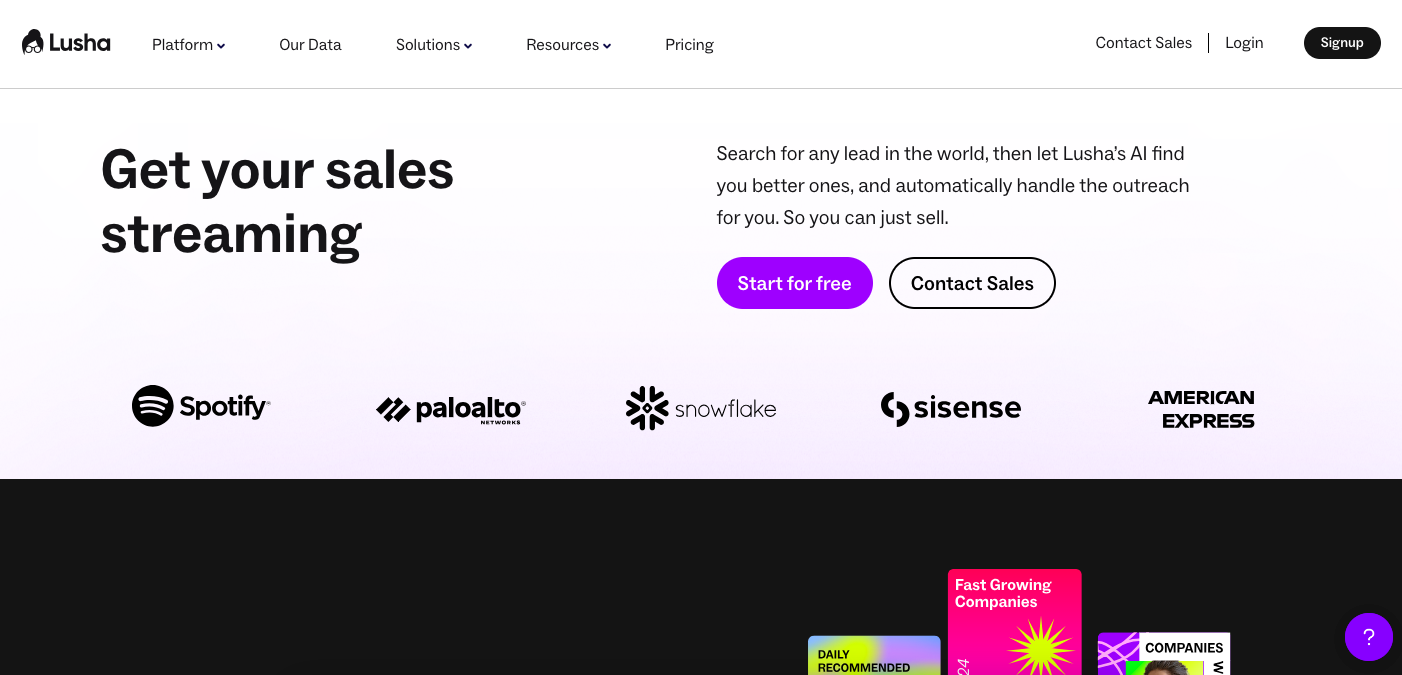
Lusha works as a browser extension that pulls up contact information while you're browsing LinkedIn or company websites. You spot someone who'd be perfect for your podcast, click the Lusha icon, and their email and phone number appear right there on the page. There's no need to copy their name into a separate tool or test different email formats.
The tool also enriches your existing contact spreadsheets by filling in missing phone numbers and updated job titles. If you keep a running list of potential guests, Lusha can update the outdated information without you manually checking each person's current role.
The limitation is that Lusha handles individual contacts, not bulk research. This means that you can't build massive guest lists or run outreach campaigns from it. But for targeted prospecting, where you already know who you want as a guest, it saves serious time.
The right lead finder tool depends on your booking volume. If you're pitching a handful of carefully selected guests each month, a simple browser extension works fine. But if you’re running weekly episodes with new guests, you’ll need something with automation and bulk search capabilities.
Most podcasters waste more time researching guests than actually interviewing them. Tools like Instantly eliminate that problem by handling both discovery and outreach in one workflow. The faster you can go from "this person would be perfect" to having them scheduled, the more energy you have left for creating great content.
The primary difference is scale. A browser extension like Lusha is perfect for grabbing contact details for individuals you've already identified. In contrast, a platform like Instantly is built for finding and contacting many potential guests at once, managing the entire process from discovery to outreach within a single system.
Many of these platforms provide more than just an email address. They offer insights like recent job changes, company funding news, or recent social media activity. You can use these details as conversation starters to make your pitch feel personal and timely, increasing your chances of getting a positive response.
While some platforms like ZoomInfo have a stronger focus on North American contacts, others offer extensive global databases. Tools like Instantly and Apollo provide access to millions of international contacts, so you can find expert guests from almost any region or industry for your podcast.
If you produce episodes frequently and need a steady stream of new guests, automation is a huge time-saver. It handles follow-ups and scheduling, freeing you to focus on preparing for interviews. For podcasters who only book a few guests a month, a simpler tool for contact discovery might be sufficient.
Yes, some tools are designed to work together. For example, you can use Clay's advanced data enrichment and then send your curated guest list directly to an outreach platform to manage the communication. This allows you to build a guest acquisition process that fits your specific needs.